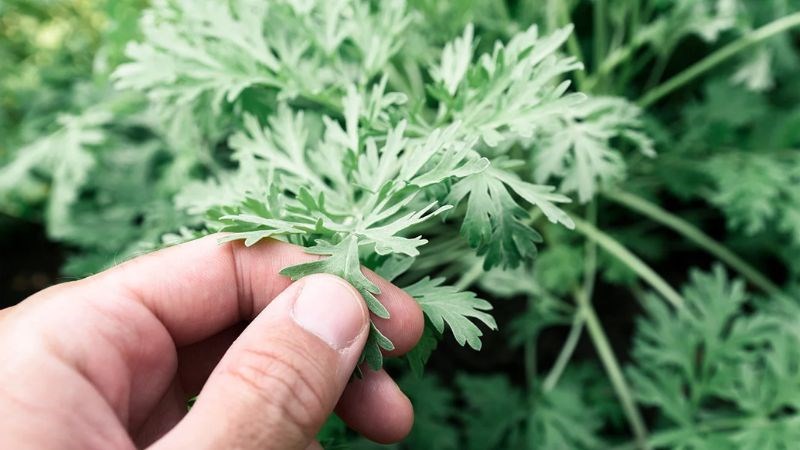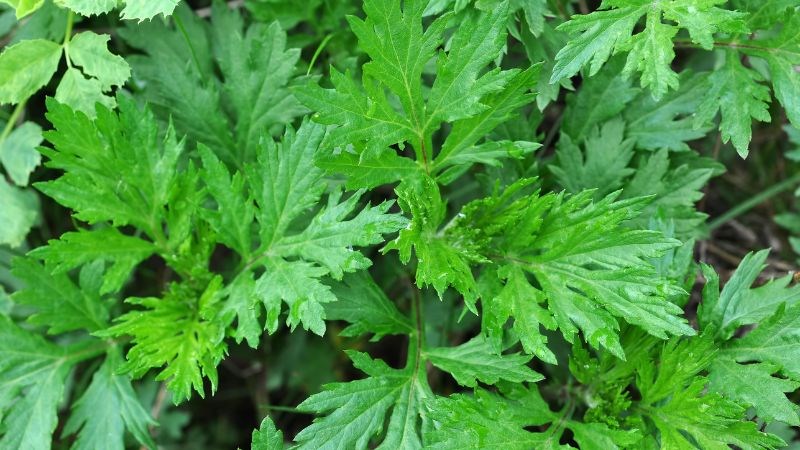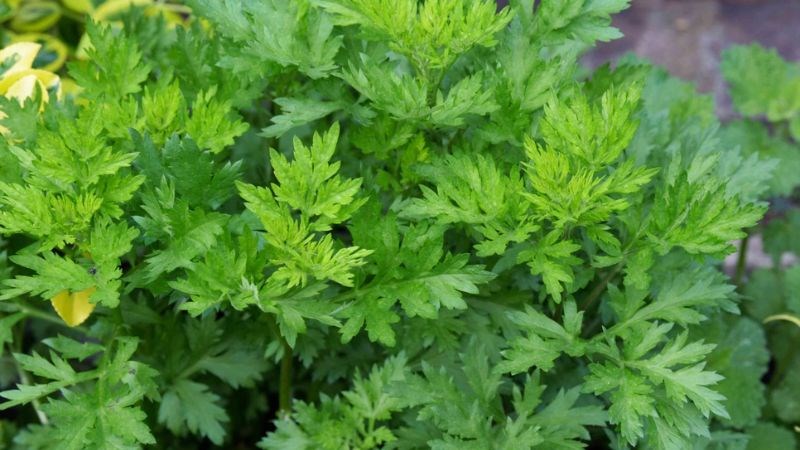Mugwort is a natural herb that is good for health, however, not everyone should use it, especially pregnant women. Follow the article below to better understand the effects of mugwort and notes when using it!
1 Description of mugwort
Mugwort is a natural herb belonging to the Asteraceae family, with the scientific name Artemisia vulgaris. They are grown or grown wild mainly in countries in Asia, North America, Europe, North Africa, Alaska.
Mugwort is about 0.4 to 1m high, with many young branches that have hairs. The leaves grow alternately with pinnate blades. Both sides of the leaves are also hairy, the underside is white and the upper side is dark green. The inflorescences grow in double clusters at the ends of the branches with small heads and light green color. The fruit has no hairs.
People collect fresh leaves of mugwort to use as medicine with the main active ingredients having biological activity such as amino acids, choline, flavonoids, adenine.

Mugwort is a natural herb belonging to the Asteraceae family.
2 Effects of Mugwort according to Modern Medicine
Treatment of osteoarthritis
A 4-week study with the participation of 90 adults with knee osteoarthritis, patients were applied 3% ointment (3 times/day) to the painful and swollen area. The results showed that this ointment helped reduce the level of pain and improve the patient’s motor function.
Mugwort is widely used in the treatment of osteoarthritis thanks to its warming properties. Helps circulate blood, reduces pain and inflammation, especially effective for people with spinal spurs and rheumatism.
However, it should be noted that mugwort should not be applied directly to the skin because the concentration of compounds is too high and can cause skin burns. Currently, there is still a lack of evidence to prove the pain-relieving effects of mugwort tea and extract.

Mugwort is used to treat bone and joint pain.
Regulates Menstruation
Mugwort is commonly used to relieve menstrual cramps, back pain, and to help regulate menstruation for those with irregular menstrual cycles.
Pregnancy
Mugwort is an effective pregnancy support remedy for pregnant women who are at risk of miscarriage. This remedy is also useful for women with cold uterus and difficulty conceiving.
However, before using mugwort to treat reproductive health problems, especially for pregnant women, it is necessary to consult a medical professional or doctor to ensure safety and effectiveness.

Mugwort can help with pregnancy
Hemostasis
Mugwort has hemostatic, anti-inflammatory, antibacterial and analgesic effects. Therefore, mugwort is considered an effective remedy in cases requiring quick and emergency first aid, especially when suffering from injuries, broken limbs or snake bites.
Improves physical weakness
Mugwort stimulates the secretion of saliva, gastric mucus and intestinal secretions, and increases bile secretion from the gallbladder, helping to improve digestive health.
Some other studies show that bitter herbs such as mugwort stimulate salivation, increase gastric secretion and appetite. Eating well helps the body to be fully supplemented with nutrients to fight physical weakness.

Mugwort has the ability to improve physical weakness.
Reduces itching and hives
Mugwort essential oil contains very good anti-inflammatory and antibacterial properties, so it can treat itching, hives, pimples, etc.
How to use: Apply fresh mugwort directly to the rash or use in bath water to help reduce inflammation, effectively treat prickly heat and hives.
Improve blood circulation
Mugwort is said to stimulate blood circulation and help eliminate toxins in the body. People who often suffer from dizziness and lightheadedness due to poor blood circulation are advised to use mugwort.
Mugwort leaves can be used as a daily food ingredient to cook soup or fry eggs. Eating mugwort leaves weekly can improve blood circulation to the brain.

Mugwort is said to have the ability to stimulate blood circulation.
Treating some respiratory diseases
Mugwort is often combined with some other herbs such as grapefruit leaves, eucalyptus,… to reduce the symptoms of colds, dry cough, sore throat,… Boiling mugwort with other herbs to get water to drink or steaming both bring great effects in supporting the treatment of some respiratory diseases.
Antiparasitic
Mugwort has been used to treat intestinal worms since ancient Egypt, where the active ingredient thujone is thought to have an antiparasitic effect. However, there is no scientific evidence to support this.
On the other hand, animal studies have shown that wormwood can fight tapeworms and other parasites, but these results have not been proven in humans. Therefore, more in-depth studies are needed to evaluate the effects of wormwood against parasites in humans.

Mugwort supports the treatment of gastrointestinal worms
Antioxidant
Mugwort also contains another bioactive compound called chamazulene, which acts as an antioxidant. It is worth noting that the concentration of chamazulene in the plant is highest during the pre-flowering stage.
Chamazulene has the effect of fighting oxidative stress in the body, preventing free radicals from damaging cells – one of the causes of the development of cancer cells, cardiovascular diseases, Alzheimer’s disease and some other diseases.

Mugwort contains antioxidants that prevent free radicals from damaging cells.
3 Dosage of Mugwort
The exact dosage recommendation for mugwort has not been determined due to lack of evidence. However, many government organizations have placed restrictions on mugwort products due to the toxic effects of some active ingredients in the plant.
In the European Union (EU), foods containing mugwort are limited to a thujone concentration of no more than 0.23 mg/pound (0.5 mg/kg) and alcoholic beverages such as mugwort wine are limited to no more than 16 mg/pound (35 mg/kg).
In the United States, the Food and Drug Administration (FDA) limits the thujone concentration in mugwort products to 10 parts per million (ppm) or less. Thujone levels at this level are considered negligible and safe for most people.
However, you should note that products such as mugwort tea and extracts are not approved by the FDA. If you are unsure about the dosage, you should consult your doctor.
4 Some remedies using mugwort
Mugwort is a natural herb that is good for health and has been used in many folk remedies to treat diseases. According to traditional medicine, mugwort is warm, bitter, and enters the liver, spleen, and kidney meridians. Below are some commonly used remedies using mugwort:
Menstrual regulation remedy
To help mugwort regulate menstruation, one week before your period, you need to use the following remedy:
Remedy 1: Take 6-12g (maximum 20g) of mugwort to boil with water or steep in boiling water like tea. Divide into 3 times a day.
Remedy 2: Drink 5-10g of mugwort powder every day.
Remedy 3: Drink 1-4g of concentrated mugwort extract every day.
In case of irregular menstruation, from the beginning of your period to the end of your period, you should use the following remedy:
Take 10g of dried mugwort.
Add 200ml of water, boil down to 100ml.
Add a little sugar to drink, divide into 2 times/day.
For irregular menstruation, you can use double the dose. After 1-2 days, you will see the effect, less tired, red and less menstrual blood.
 Mugwort is often used in menstrual regulation medicine.
Mugwort is often used in menstrual regulation medicine.
Pregnancy medicine
Pregnant women, if experiencing abdominal pain and bleeding, should use the following medicine:
Take 16g of mugwort leaves, 16g of perilla leaves.
Add 600ml of water, boil down to 100ml.
Divide the decoction into 3-4 doses to drink during the day.
Remedy for acne, rashes
To have bright and rosy skin, you can use a remedy from fresh mugwort leaves:
Take fresh mugwort leaves, crush them and apply on your face for about 20 minutes.
Then wash your face again.
Do this regularly to effectively treat acne and beautify your skin.
For children who often have prickly heat, you can use crushed mugwort leaves, then filter the water to bathe your child.

Fresh mugwort leaves can be used to treat acne.
Remedy for sciatica, joint pain, headaches and dizziness
To treat sciatica, joint pain, headaches and dizziness, you can make the following remedy:
Take 300g of fresh mugwort, wash it and crush it.
Add 2 tablespoons of honey.
Squeeze the juice and drink it at noon and in the afternoon.
Drink continuously for 1-2 weeks to achieve the effect.
Remedies to help blood circulation to the brain
Remedies containing mugwort will help improve the circulation and transport of blood to the brain:
Take a handful of fresh mugwort leaves, then chop them finely.
Beat the chopped mugwort leaves with 1 egg.
Season to taste and then pour into a pan to fry until cooked and eat.

Medicine with mugwort helps improve blood circulation and transport to the brain
Remedy for physical weakness and poor appetite
Mugwort stimulates appetite, thereby providing enough nutrition and energy for the body to fight weakness. The remedy for weakness is made as follows:
Take 250g fresh mugwort, 2 pears, 20g wolfberry, 10 cloves, 1 150g black chicken.
Add 500ml of water, season to taste, simmer until 250ml remains.
Divide the pot of stewed chicken with mugwort into 5 portions, eat during the day. Use continuously for 1 – 2 weeks

Mugwort stimulates appetite, improves health, and prevents weakness.
Skin Brightening and Moisturizing Remedy
You can make a skin brightening and moisturizing remedy containing mugwort with the following steps:
Take fresh mugwort leaves and blanch them in boiling water.
Then, take them out and chop them finely, add 500ml of water, boil for about 20 minutes.
Strain out the residue, wait for the water to cool, then put it in a glass jar, store in the refrigerator for later use.
Every day, take a sufficient amount and apply evenly on the face in the morning, noon and before going to bed (use regularly to achieve the moisturizing effect of making the skin bright and smooth).
Remedies for prickly heat, scabies and rashes in children
Children with prickly heat, scabies and rashes can use remedies containing mugwort with the following steps:
Take a handful of fresh mugwort leaves, crush and squeeze out the juice.
Mix the mugwort juice with water to bathe the child.

Children with prickly heat and scabies can bathe in boiled mugwort water.
5 Some notes when using mugwort
Although mugwort is very good for health, if used incorrectly, it can lead to unwanted effects. Therefore, before using mugwort, you need to understand the following notes:
Subjects should not use: Pregnant or breastfeeding women, women who have had miscarriages or premature births, people with epilepsy, allergies, people with heart disease, kidney disease. Drug interactions: Do not use mugwort when being treated with antidepressants, diabetes, anticoagulants, cancer, antibacterial drugs, etc.
Mugwort can cause burns if applied directly to the skin, it should only be used in ointment or liquid form.
Eat mugwort up to 3 times a week, no more than 5 shoots each time.
Do not use any mugwort product for more than 4 weeks.
Overdose of the recommended dose can lead to poisoning, digestive disorders, kidney failure, nausea, vomiting and convulsions.
Be careful when using mugwort with people who are sensitive to herbs.
Note: Can pregnant women eat mugwort?
Mugwort is a rich source of vitamins and minerals, especially folate – which plays an important role in the development of the nervous system and prevents birth defects in newborns. However, it should be noted that mugwort also contains a substance called thujone – which stimulates uterine contractions, causing miscarriage or premature birth. Thujone can also cause kidney failure in pregnant women.
Therefore, in the first three months of pregnancy, pregnant women should avoid eating mugwort. From the fourth month onwards, mothers should consult with specialists about the use of mugwort. If it is indicated to be used, pregnant women should remember not to use too much, maximum 2 times/month, each time using only 3 to 5 shoots of the vegetable.
Up to now, there has been no research confirming the safety of using mugwort for pregnant women. An experiment on mice has shown that the use of mugwort during pregnancy increases the rate of miscarriage in mice. Therefore, pregnant women need to be careful when using mugwort.
Hopefully the above article has helped you better understand the effects of mugwort and precautions when using it. If you need to use mugwort in the treatment of a disease, you need to consult a doctor.





